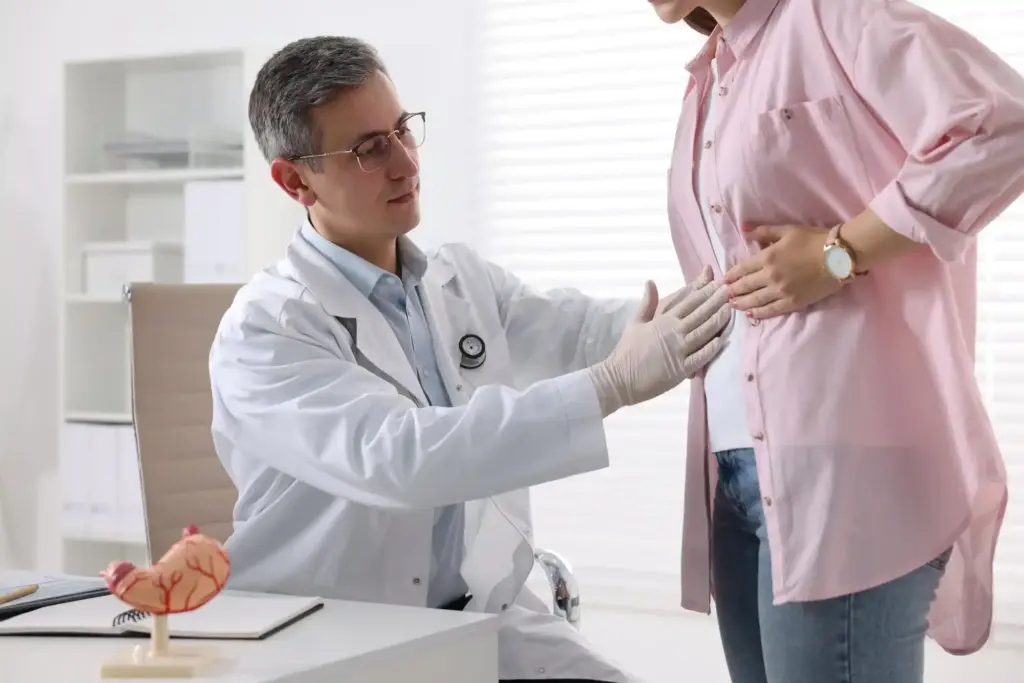Abdominal Gastroenterology – Advanced Diagnosis
Get expert care for abdominal gastroenterology conditions with accurate diagnosis, minimally invasive treatments, and personalized digestive health management for faster recovery.

Abdominal Gastroenterology
Abdominal Gastroenterology is a specialized branch of medicine that deals with the diagnosis and treatment of disorders affecting the digestive system — including the stomach, liver, gallbladder, intestines, pancreas, and colon. These organs work in harmony to process food, absorb nutrients, and eliminate waste. When any of these functions are disrupted, it can lead to pain, discomfort, or serious digestive diseases.
At VS Hospitals, Chennai, the Department of Abdominal Gastroenterology brings together leading gastroenterologists, hepatologists, and surgeons who are experts in managing both acute and chronic gastrointestinal disorders. Using advanced diagnostic systems, minimally invasive procedures, and a multidisciplinary approach, VS Hospitals ensures patients receive comprehensive and personalized care.

Early Detection Saves Lives
Early detection and treatment are crucial for improving the chances of survival. If you notice any concerning symptoms, consult a healthcare provider immediately.
Signs and Symptoms
Abdominal Pain or Cramping
Persistent or recurrent pain could indicate ulcers, gallstones, or inflammatory bowel disease.
Bloating and Gas
Frequent bloating may be linked to irritable bowel syndrome (IBS) or lactose intolerance.
Nausea and Vomiting
These are early warning signs of gastritis, pancreatitis, or food poisoning.
Loss of Appetite
A reduced desire to eat may occur due to liver disease, ulcers, or infections.
Unexplained Weight Loss
Significant weight loss without trying could be a sign of cancer or malabsorption disorders.
Heartburn or Acid Reflux
Burning sensations in the chest or throat suggest gastroesophageal reflux disease (GERD).
Diarrhea or Constipation
Frequent changes in bowel habits often signal infections or digestive tract disorders.
Blood in Stool
Visible or hidden blood in the stool can indicate ulcers, hemorrhoids, or colorectal cancer.
Blood in Urine
Hematuria - pink, red, or dark urine, the most common symptom
Frequent Urination
Feeling the need to urinate frequently, even when bladder is not full
Painful Urination
Experiencing pain or burning sensation while urinating
Back or Pelvic Pain
Pain that occurs as the cancer grows and spreads
Unexplained Weight Loss
Significant weight loss not related to diet or exercise
Fatigue
Feeling unusually tired or weak without a clear cause
Meet Our Expert Abdominal Gastroenterologists
Risk Factors
Smoking
Smoking is one of the leading causes of bladder cancer. Chemicals in tobacco smoke can damage the lining of the bladder, increasing the risk.

Gender
Men are at a higher risk of developing bladder cancer than women.

Chronic Bladder Infections or Inflammation
Conditions such as bladder infections and long-term bladder inflammation can increase the risk.

Exposure to Chemicals
Prolonged exposure to certain chemicals, especially those used in the dye industry, rubber production, and chemical manufacturing, increases the risk.

Unhealthy Diet
Consuming high-fat, processed, or spicy foods can trigger gastritis, ulcers, or gallbladder disease.

Excessive Alcohol Intake
Chronic alcohol consumption damages the liver and can cause pancreatitis.

Smoking
Tobacco affects the digestive lining and increases the risk of acid reflux and stomach cancer.

Sedentary Lifestyle
Lack of physical activity contributes to constipation, obesity, and slow metabolism.

Stress
Chronic stress disturbs the gut-brain connection, worsening conditions like IBS and ulcers.

Genetic Predisposition
Family history plays a role in diseases such as colon cancer and Crohn’s disease.

Medication Overuse
Prolonged use of painkillers or antibiotics can harm the digestive lining and liver.

Obesity
Being overweight increases pressure on the abdomen, leading to acid reflux and fatty liver disease.

Abdominal Gastroenterology
Diet and Nutrition
Prevention
Diagnosis
Key Services
Key Facilities
Nutrition plays a crucial role in maintaining gastrointestinal health and preventing recurrence of digestive disorders. The gastroenterology team at VS Hospitals offers tailored diet plans for different conditions.
- Balanced Meals: Emphasis on whole grains, lean proteins, fresh fruits, and vegetables for better gut function.
- Fiber Intake: Adequate dietary fiber supports regular bowel movement and prevents constipation or diverticulosis.
- Hydration: Proper water intake helps digestion and prevents bloating or dehydration-related complications.
- Low-Fat Options: Avoiding fried or greasy foods reduces the risk of acid reflux and gallbladder stress.
- Probiotic Foods: Yogurt, kefir, and fermented foods restore healthy gut bacteria after infections or antibiotic therapy.
- Avoiding Triggers: Patients with reflux or ulcers are advised to limit caffeine, alcohol, and spicy foods.
- Specialized Diet Plans: For liver patients, low-sodium and protein-balanced diets help prevent fluid buildup and fatigue.
A registered dietitian at VS Hospitals works closely with each patient to craft meal plans that complement their treatment goals.
Preventing gastrointestinal disorders begins with conscious lifestyle and dietary choices. VS Hospitals encourages proactive healthcare through:
- Routine Screening Tests: Regular endoscopy or colonoscopy helps detect early signs of ulcers, polyps, or cancers.
- Weight Management: Maintaining a healthy weight reduces the risk of fatty liver and reflux disease.
- Quit Smoking & Limit Alcohol: Eliminating these habits drastically cuts down liver and stomach-related complications.
- Stress Control: Yoga, meditation, and regular exercise improve gut motility and digestive efficiency
- Safe Food Practices: Eating freshly prepared meals and maintaining kitchen hygiene prevent infections and food poisoning.
- Vaccinations: Hepatitis A and B vaccines reduce the risk of viral liver infections.
- Regular Medical Check-ups: Annual health assessments at VS Hospitals help identify issues before they progress into chronic diseases.
Prevention is not just about avoiding disease it’s about building a digestive system that supports your overall health and energy.
Accurate diagnosis is the foundation of effective treatment. At VS Hospitals, the gastroenterology department is equipped with cutting-edge diagnostic technology that helps identify the exact source of discomfort or disease.
Diagnostic Methods Include:
- Endoscopy: A thin, flexible tube with a camera helps visualize the upper gastrointestinal tract and detect ulcers, bleeding, or inflammation.
- Colonoscopy: Used to examine the colon and rectum, crucial for identifying polyps or colorectal cancer.
- Ultrasound and CT Scans: Imaging studies help assess the liver, pancreas, and gallbladder for structural abnormalities.
- Liver Function Tests: Detects inflammation, cirrhosis, and hepatitis-related complications.
- Stool Analysis: Helps identify infections, bleeding, or malabsorption disorders.
- Barium Swallow or Enema: Specialized X-rays that show the movement of food and liquid through the digestive tract.
- Biopsy: Tissue samples are taken to detect cancerous or precancerous changes.
- Capsule Endoscopy: A swallowable camera captures images throughout the digestive tract for detailed analysis.
The VS Hospitals diagnostic team ensures every test is handled with precision, compassion, and patient comfort in mind.
VS Hospitals stands as one of Chennai’s most advanced centers for abdominal and digestive care. The department of Abdominal Gastroenterology offers a wide range of treatments from non-invasive therapy to complex surgical interventions all tailored to patient needs.
Comprehensive Services Include:
- Management of GERD and Peptic Ulcers: Advanced acid suppression therapy, dietary modification, and endoscopic interventions.
- Liver and Pancreatic Disorders: Expertise in treating hepatitis, cirrhosis, fatty liver disease, and pancreatic inflammation.
- Gallbladder and Biliary Diseases: Minimally invasive surgeries for gallstones and bile duct blockages.
- Inflammatory Bowel Disease (IBD): Personalized medication plans and nutritional support for Crohn’s disease and ulcerative colitis.
- Irritable Bowel Syndrome (IBS): Integrative treatment combining medication, probiotics, and stress management.
- Colorectal Cancer Screening: Early detection programs using colonoscopy and advanced imaging tools.
- Digestive Tract Infections: Targeted antibiotic and hydration therapy to treat bacterial and viral infections.
- Endoscopic Procedures:
- Polypectomy
- ERCP (Endoscopic Retrograde Cholangiopancreatography)
- Esophageal Dilation
- Variceal Band Ligation
- Minimally Invasive Surgery: Laparoscopic surgeries for hernia, appendix, or bowel obstruction, ensuring faster recovery and minimal pain.
- Nutritional and Lifestyle Counseling: Customized diet plans and wellness programs to support long-term digestive health.
Each patient at VS Hospitals benefits from multidisciplinary collaboration — gastroenterologists, dietitians, surgeons, and physiotherapists — working together for holistic recovery.
VS Hospitals has built a reputation as one of the most trusted healthcare destinations in Tamil Nadu for gastrointestinal care. Its state-of-the-art infrastructure and dedicated specialists make it a go-to choice for patients seeking safe, precise, and compassionate treatment.
Top Facilities Include:
- Advanced Endoscopy Suite: Equipped with high-definition scopes and real-time imaging for superior diagnostic clarity.
- Laparoscopic Surgical Units: Specialized equipment enabling keyhole surgeries with minimal scarring and faster healing.
- Modern Intensive Care Units (ICUs): For patients requiring post-operative or critical digestive care monitoring.
- Comprehensive Liver Care Unit: Dedicated team for liver disease management, including liver biopsies and transplant evaluations.
- 24/7 Emergency & Trauma Care: Immediate intervention for gastrointestinal bleeding, acute abdominal pain, and perforations.
- Day-Care Gastro Procedures: Allows minor endoscopic treatments without overnight hospital stay.
- In-House Laboratory & Radiology Services: Streamlined testing and reporting for quicker diagnosis.
- Digital Health Records & Teleconsultation: Seamless access to reports and virtual consultations with senior gastroenterologists.
- Patient Support & Rehabilitation: Post-surgery physiotherapy, counseling, and long-term follow-up programs to ensure sustained recovery.
VS Hospitals continues to invest in next-gen medical technology and patient-centered care models, positioning itself as one of Chennai’s leaders in abdominal gastroenterology.
Top Medical Facilities at Our Multispeciality Hospital – Here’s What Makes Us Different!
Frequently Asked Questions
VS Hospitals stands out for its team of top gastroenterologists, advanced endoscopic facilities, and patient-focused care. The hospital provides accurate diagnosis, minimally invasive surgeries, and personalized treatment plans, making it a trusted destination for digestive and liver-related disorders in Chennai.
VS Hospitals manages a wide range of conditions such as GERD, ulcers, IBS, gallstones, liver diseases, pancreatitis, and colorectal cancer. The team uses advanced diagnostic tools and evidence-based medical therapies to ensure comprehensive recovery and long-term gastrointestinal wellness.
Yes. VS Hospitals specializes in minimally invasive and endoscopic treatments that reduce pain, hospital stay, and recovery time. With expert surgeons and world-class equipment, procedures are performed safely with maximum precision and patient comfort.
